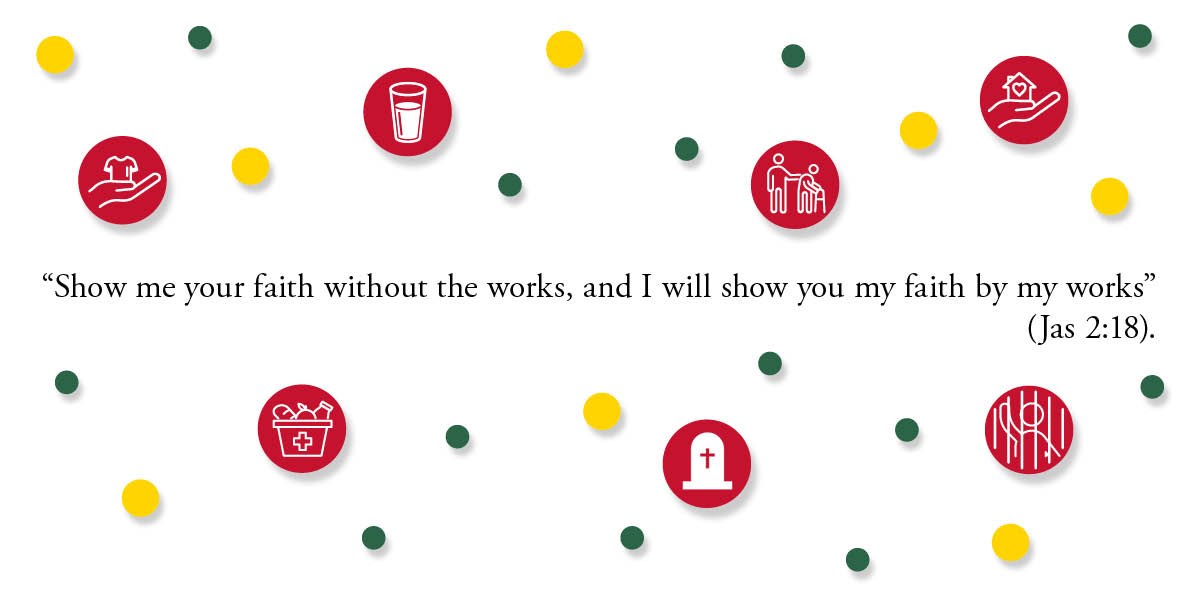
Show and Tell: The Corporal and Spiritual Works of Mercy
Show and tell. Whether in school or upon opening a gift in the company of others or when sharing a picture that holds particular meaning with family and friends, each one of us has an experience of this childhood activity. We know the game and how it is supposed to be played.
There are always two components – “show” and “tell” – and we recognize the incompleteness of the activity when one of these parts is absent. If the object is just shown, we might say, “Tell me about it,” or if only explained, one may say, “Show me, so that I might understand.” In short, it is not “either this or that” but “both this and that” — or as it says in Sacred Scripture: “Show me your faith without the works, and I will show you my faith by my works” (Jas 2:18).
We regularly hear about and are exhorted to engage in the Corporal Works of Mercy – feeding the hungry; giving drink to the thirsty; clothing the naked; sheltering the homeless; visiting the sick and those in prison; and burying the dead. These acts of charity are denoted by our Lord when He speaks of His Second Coming, the Final Judgement, and the separation of the sheep and the goats (Matt 25:31-46).
The significance of carrying out these labors cannot be underestimated, especially when they are done in the light of faith, specifically for Christ, and to the salvific benefit of the other person.
The doing of good works and modeling them for others is insufficient because of its incompleteness. The work is good but unfulfilled since it is only part of the process. This is “show” without the “tell.”
How often parents lament the fact that their children, who they raised in the faith, are no longer practicing or engaged in it. By their witness, parents show the importance of the faith to their children. But if all they do is put on a show of goodness without explanation, the reason behind their action will never be made fully manifest; it will be a show of goodness that is indeed truly important for them – the acting parents – but lacking significance as to why and how it is transformative for their children – those watching the good action.
In every show there is a plot, a narration that makes the action meaningful. Herein, then, lies the importance of the Spiritual Works of Mercy within the life of every Christian. Words, manifested by these spiritual sorks, are not separate from actions, the Corporal Works, but are absolutely necessary for the Gospel’s full and complete proclamation, so that this unity in faith – actions and words – may blossom and flourish together and complement each other.
Each of us is composed of a physical nature and a metaphysical one: We are a body-soul composite. And as it is critical to nourish and care for our physical nature by food, drink, clothing and shelter, it is just as crucial, if not more so, to attend to a person’s metaphysical nature by counseling the doubtful, instructing the ignorant, admonishing the sinner, comforting the sorrowful, forgiving injuries, bearing wrongs patiently and praying for the living and the dead. Precisely by means of the interplay between the Corporal and Spiritual Works of Mercy do we appreciate the importance of “show and tell.”
All too often, we accomplish well the “showing” component of the faith while neglecting its “telling” counterpart, and unfortunately the hand-in-hand unity of the faith’s “show and tell” reality is not fulfilled. The consequence of this undeveloped – or severely underdeveloped – unity stems from decades of poor catechesis, an over-exaggeration of the importance of “doing” Christianity rather than “being” a Christian in the full and complete expression of the faith and a lukewarm desire to grow in courage and fortitude when faced with hardships and difficulties.
In short, we go back to what we know, where we are comfortable and what is familiar – an overplay of showing but not telling; an emphasis on Jesus as true man, but not true God; much time and energy attending to the physical, but not the metaphysical dimension of the human person.
Proper and comprehensive formation has both an intellectual component – learning about Jesus Christ and His Church – and a pastoral one – engaging the information one has learned and applying it to the lived experience of God’s people for the purpose of salvation in Christ. Through prayer and study every faithful Christian is called to learn of and think with the mind of Christ and His Church, so that he may attend to God’s people comprehensively – that is to say, in a properly oriented, balanced and total manner, both in deed and word.
Where are you at? Show? Tell? Remember, as a Catholic, every day is show and tell.
—Father James Dodson is director of vocations for the Diocese of Burlington and pastor of Nativity of the Blessed Virgin Mary-St. Louis Parish in Swanton and Highgate Center.
—Originally published in the Winter 2022 issue of Vermont Catholic magazine.

